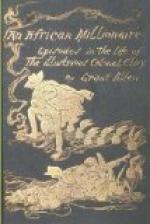So he made up his mind, it being now December, to return to London. We met the Count next day, and stopped his carriage, and told him so. Charles thought this would have the immediate effect of bringing the man to reason. But he only lifted his hat, with the blackcock’s feather, and smiled a bland smile. “The Archduke Karl is inquiring about it,” he answered, and drove on without parley.
Charles used some strong words, which I will not transcribe (I am a family man), and returned to England.
For the next two months we heard little from Amelia save her regret that the Count wouldn’t sell us Schloss Lebenstein. Its pinnacles had fairly pierced her heart. Strange to say, she was absolutely infatuated about the castle. She rather wanted the place while she was there, and thought she could get it; now she thought she couldn’t, her soul (if she has one) was wildly set upon it. Moreover, Césarine further inflamed her desire by gently hinting a fact which she had picked up at the courier’s table d’hôte at the hotel—that the Count had been far from anxious to sell his ancestral and historical estate to a South African diamond king. He thought the honour of the family demanded, at least, that he should secure a wealthy buyer of good ancient lineage.
One morning in February, however, Amelia returned from the Row all smiles and tremors. (She had been ordered horse-exercise to correct the increasing excessiveness of her figure.)
“Who do you think I saw riding in the Park?” she inquired. “Why, the Count of Lebenstein.”
“No!” Charles exclaimed, incredulous.
“Yes,” Amelia answered.
“Must be mistaken,” Charles cried.
But Amelia stuck to it. More than that, she sent out emissaries to inquire diligently from the London lawyers, whose name had been mentioned to us by the ancestral firm in Unter den Lauben as their English agents, as to the whereabouts of our friend; and her emissaries learned in effect that the Count was in town and stopping at Morley’s.
“I see through it,” Charles exclaimed. “He finds he’s made a mistake; and now he’s come over here to reopen negotiations.”
I was all for waiting prudently till the Count made the first move. “Don’t let him see your eagerness,” I said. But Amelia’s ardour could not now be restrained. She insisted that Charles should call on the Graf as a mere return of his politeness in the Tyrol.
He was as charming as ever. He talked to us with delight about the quaintness of London. He would be ravished to dine next evening with Sir Charles. He desired his respectful salutations meanwhile to Miladi Vandrift and Madame Ventvorth.
He dined with us, almost en famille. Amelia’s cook did wonders. In the billiard-room, about midnight, Charles reopened the subject. The Count was really touched. It pleased him that still, amid the distractions of the City of Five Million Souls, we should remember with affection his beloved Lebenstein.




